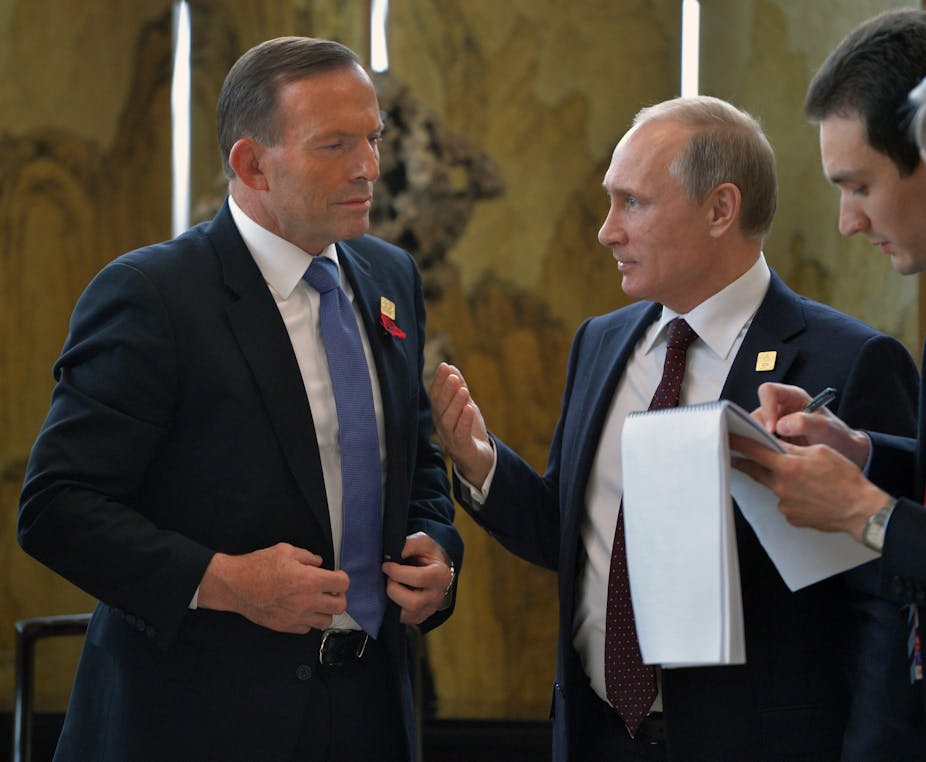Although Australian Prime Minister Tony Abbott believes the G20 should focus solely on economic issues, leaving security, social and environmental challenges to other forums, external pressures continue to mount as G20 leaders head into their two-day meeting in Brisbane.
As this year’s host, Abbott prioritised creating growth and jobs, stronger financial regulation, tax fairness, freer trade and infrastructure finance as the issues the summit and its leaders will take up.
But overshadowing this agenda is the presence of Russian President Vladimir Putin and his involvement in the destabilisation of Ukraine and the downing of Malaysian Airlines flight 17 (MH17). A second concern is the expanding terrorist conquest by ISIS across the Middle East and the isolated but related incidents around the world. And finally, the Ebola pandemic is having a devastating impact in West Africa, amid fears it might spread into the United States and Europe.
In reality, the success of the Brisbane summit will largely come from the work ministers and officials have done in the last nine months. The first of these successes is meeting the goal the finance ministers set in February 2014 of lifting growth by an additional 2% or more by 2018. To do so, they will produce individual country action plans that, the International Monetary Fund (IMF) and Organisation for Economic Cooperation and Development (OECD) confirmed, will together meet this goal. However, it has now been acknowledged that the slowdown in the global economy means a target of “more than 2%” is needed.
In the area of financial regulation and supervision, leaders will approve the work produced by the Financial Stability Board (FSB) on resolution regimes for globally significant banks, on insurers and derivatives. They will build on the strong success of past summits to help prevent a new global financial crisis from breaking out. Success in the area of financial regulation and supervision will come if G20 leaders act to strengthen and harmonise international accounting standards in order to make all other financial regulatory reforms work.
Some success will also come on infrastructure. The leaders plan to launch a Global Infrastructure Initiative, containing a database that matches projects with potential investors, a knowledge platform containing expertise, standardised documentation and best practices, country commitments to improve their investment climate, assistance for new sources of finance and a Global Infrastructure Hub. This will be the first step towards creating the operating pubic-private partnerships needed for the additional 2% growth plan and raising the estimated US$60-70 trillion for projects in the next 15 years.
An important initiative is likely to come in the area of employment. The G20 leaders are expected to commit to increasing the percentage of women in the workforce. The initial target will be to narrow the gap between men and women in the workforce by 25% by 2025.
Failing to keep up
But the 2014 Brisbane summit is unlikely to produce many achievements beyond those already achieved by their ministers and international organisations. This is largely for two reasons.
The first is the inexperience of this year’s host, Tony Abbott. Abbott, who has no previous experience as either host or attendee of a G20 summit, also has a strong belief that governments are limited in the good they can achieve and has a strong preference for private sector work. He has also been determined to limit the agenda entirely to economic issues, but this approach is problematic as other political security issues continue to mount. These issues are bound to have severe economic impacts.
Because the big shocks on the road to Brisbane have erupted on these latter subjects - Ukraine, Islamic State and, above all, Ebola - the summit is poorly designed to deal with them. Moreover it is here where the failing United Nations most needs the G20’s help, whereas in the economic field, the International Monetary Fund, OECD and the G20’s own FSB, if not the WTO, have been performing well.
Within the G20, the country most able to lead is a United States with its surging currency and growth. But it is now led by an unpopular, lame duck president, whose party has just lost control of both houses of Congress. And the most domestically popular leader at Brisbane, Russia’s Vladimir Putin, comes from a country whose economic capability and connectivity, and political openness, are shrinking fast. The many inexperienced leaders who will be at Brisbane - from Australia, India, Turkey, Indonesia and Argentina – will make it more difficult to forge a unifying personal bond.
With the summit still ahead of them, the G20 leaders still have an opportunity to move forward on the progress made by their ministers in the last nine months to make the Brisbane summit successful.
They can set a new goal of raising global growth by 3% above trend over the next five years and returning global growth to the 4% annual level that prevailed before the global financial crisis hit.
Second, the leaders should recognise the economic impact of the conflict in Ukraine and take the opportunity to have a frank discussion with President Putin. They need to help him realise Russia must reverse course, before Russia’s relative capability and connectivity are reduced so much that it is no longer a systemically significant state.
And lastly, the summit must acknowledge that climate change harms economic growth and that bold action to control climate pollution is needed now. Without this action, G20 leaders risk riding the coat-tails of their ministers and giving the world the impression that their meeting is not necessary.

